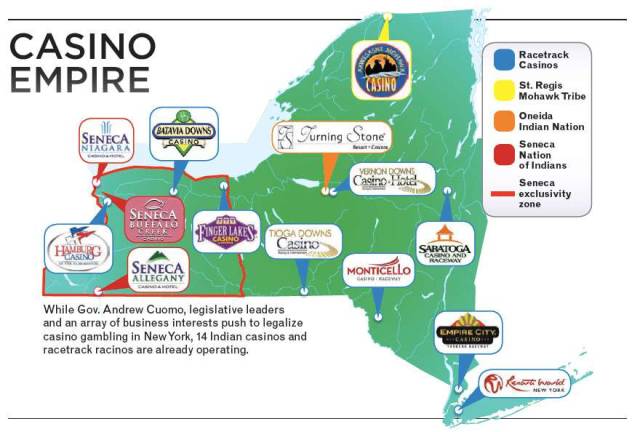City

With billions at stake among tough competitors, the only sure winners are lobbyists To a certain kind of operator, New York is filled with rich deposits of gold. From upstate mountains to western farmlands to city streets, the state is dappled with places ideal for extracting that gold from other people's pockets and putting it in their own. These operators want to mine that gold. They want to build casinos aimed at tourists dazzled by the bright lights, at locals who have to leave the state to place a bet, at politicians giddy with the prospect of thousands of jobs and a flood of revenue. And the state wants to pave their way. But not everyone wins in a gold rush. If New Yorkers approve full-scale casino gambling in a public referendum, some of the companies that now run smaller, limited casinos will surely rake in millions of dollars-and others will see their profits tumble. The nine racetrack casinos currently doing business in New York will face off for the chance to upgrade their facilities with more slot machines and upscale table games like poker and blackjack- but at least two, and possibly more, will be left in the dust. Gambling behemoths like Wynn Resorts and Las Vegas Sands, which specialize in the "destination" casinos Gov. Andrew Cuomo is dreaming of, are also eyeing New York opportunities- as well as their Malaysian competitor, Genting, which beat them all by getting the first toehold in New York City. And for the state's five Native American casinos, as well as some nearby casinos in places like Atlantic City and Connecticut, legalized gambling in New York could decimate their finances. They want to stop the spread of gambling if possible, or at least keep it far from their own casinos. Amid these shifting and competing agendas, the landscape is still being shaped. The governor and legislative leaders have not agreed how new casino licenses would be awarded, where they could go, who would be eligible and whether existing operators would get special treatment. The answers to those questions will determine who gets rich and who gets hurt in this gold rush. But one group is certain to win no matter what: lobbyists. "Lobbyists are going to do what's good for them," said Jeff Gural, who owns the racetrack casinos at Tioga Downs and Vernon Downs. "They're going to convince casino companies, 'Why don't you hire me, and let me try to get you a license?' If you're asking me if this bill is good for lobbyists, I'd have to say yes." It's been the same equation in other states, from Ohio to Florida to Maryland and Massachusetts: Whether or not casinos are ultimately legalized, lobbyists always get their cut. It's no different in Albany, where lobbyists form a permanent shadow government that understands how to work a famously opaque system to either get things done or block them, especially when plenty of cash is at stake. The New York Gaming Association, a coalition of the state's racetrack casinos, estimates more than $3 billion leaves the state each year as gamblers shuttle off to Atlantic City, catch a bus to Connecticut's Foxwoods or Mohegan Sun or hop on a flight to Las Vegas-and one thing that stays in Vegas is the cash spent by visiting New Yorkers. To read the full article at City and State click here.